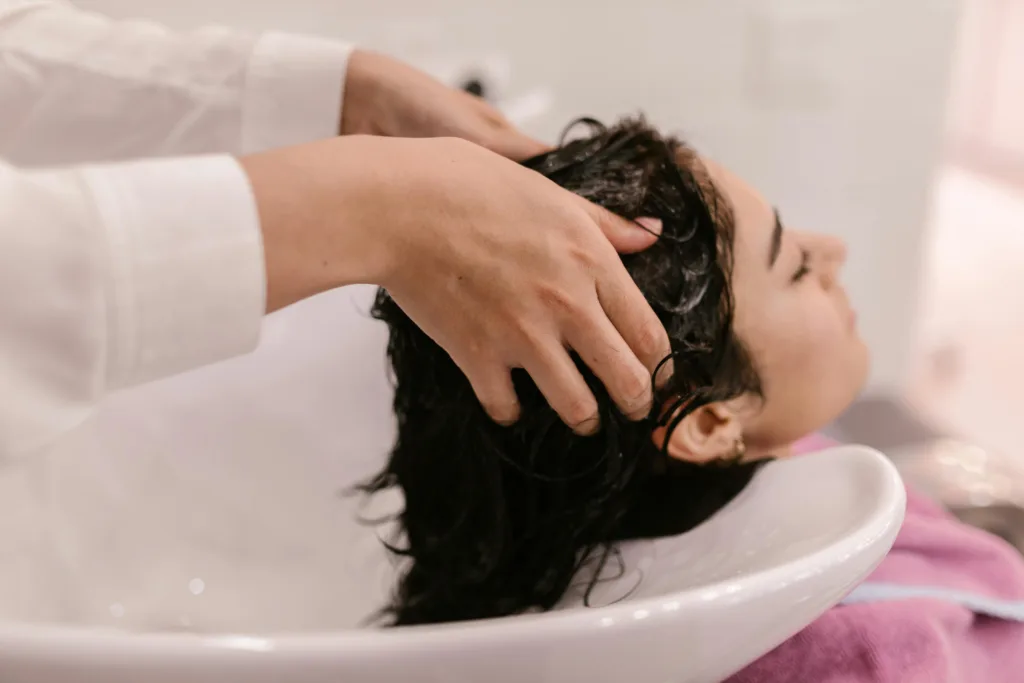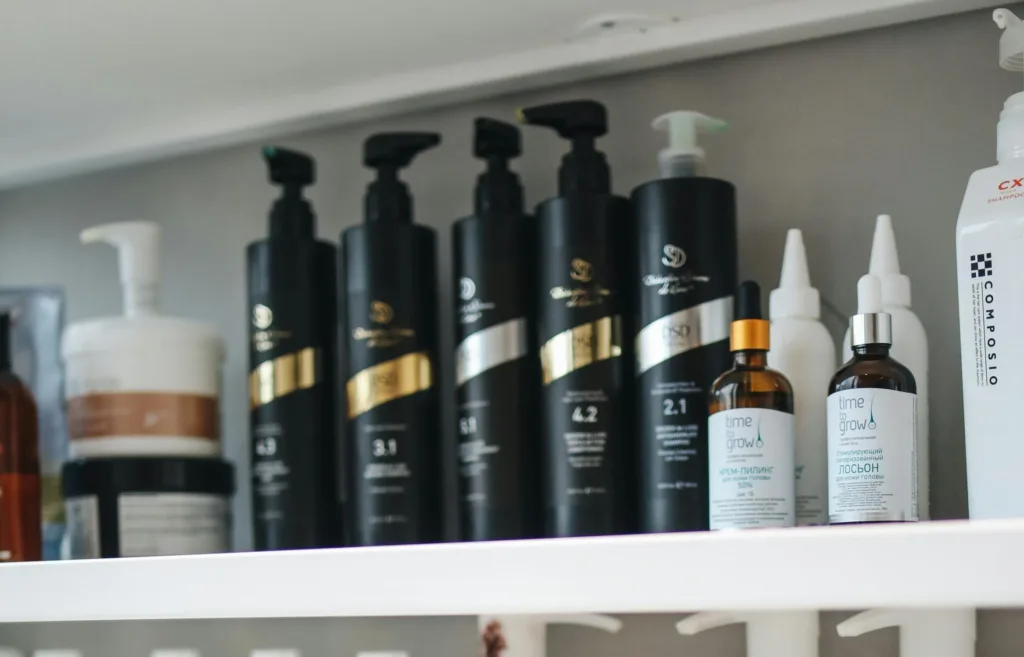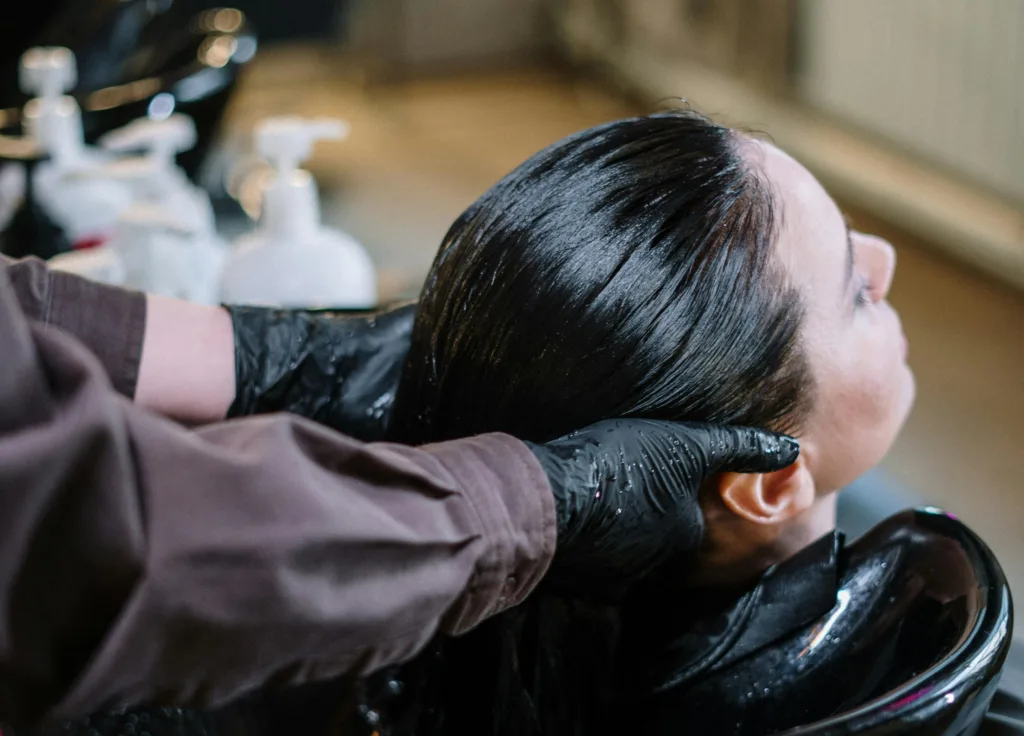Deciding whether should I put conditioner on my scalp is a question every girl has wondered at some point in her life. Conditioner helps keep hair soft and smooth, but putting it on the scalp can cause problems for some people. This blog will examine the good and bad sides of using conditioner on the scalp. It will help you decide what’s best for your hair care routine.

What A Conditioner Does and Why You Use It?
Conditioner acts like a refreshing drink for your hair, reversing the drying effects of shampoo. It infuses moisture, making hair soft and smooth. It also detangles, adds shine, protects from damage, and tames frizz – all essential for healthy, manageable hair.
So, think of conditioner not just as an extra step, but as a key part of your hair care routine!
Should I Put Conditioner On My Scalp?
Conditioner on the scalp? It depends! While some scalp-friendly formulas can soothe dryness, itch, or even dandruff, traditional conditioners might weigh down your hair and make it greasy, especially for oily scalps. If you have a dry scalp or fine hair, scalp conditioning could be a good fit.
Otherwise, focus on applying conditioner to the mid-lengths and ends. Experiment with a small amount on your scalp to see how your hair reacts. The key is to find what works best for your unique hair and scalp!
Conditioner On Scalp: Pros and Cons
Conditioner is great for dry, tangled ends but might not be best for your scalp. Here’s a breakdown to help you decide if it’s right for your scalp care routine:
Pros:
Moisture Boost: If you have a dry, itchy scalp, certain conditioners can add moisture, soothing irritation and maybe even helping with dandruff.
Adds Volume: For fine hair, a bit of conditioner on the scalp can make hair look fuller without making it heavy.
Cons:
Can Make Hair Greasy: Regular conditioners can be heavy and make your hair look greasy, especially if your scalp is naturally oily.
Too Much is a Problem: Using too much conditioner on your scalp or not rinsing it out well enough can make your hair look even greasier and cause buildup.
Who Benefits?
Scalp conditioning is a game-changer for many! If your scalp feels dry and itchy, it can provide essential moisture to soothe discomfort. Those with fine hair will also love it, as applying a small amount on the scalp can add volume without weighing down the ends of their hair.
Who Might Skip It?
If your scalp gets oily quickly, it’s better to avoid putting conditioner on it. Focus on conditioning the middle and ends of your hair instead.
Observe how your hair and scalp respond. Try a little conditioner on your scalp to see how it feels. If you’re not sure, stick to applying conditioner where your hair needs it most – usually the middle and ends.

Should I Put Conditioner On My Dry Scalp?
For a dry scalp, conditioner can be a friend! It adds moisture that soothes itchiness and can reduce flaking on a dry scalp. But if your roots get oily, it’s better to apply conditioner mainly to the middle and ends of your hair to avoid making it heavy.
Look for conditioners made for dry scalps—they’re lighter and won’t weigh down your hair as much. Try a small amount on your scalp to see what works best for you and keeps your hair feeling just right.
Should I Put Leave-In Conditioner On My Scalp?
Using a lightweight leave-in conditioner can help if you have a dry scalp. It adds moisture that soothes irritation and might even improve dandruff. But if your scalp is oily, using a leave-in conditioner can be tricky. It might make your hair look greasy and heavy.
Start with a small amount on your scalp to see how your hair reacts. Look for leave-in conditioners made for dry scalps—they’re lighter and less likely to weigh down your hair.
Can I Use Leave In Conditioner Everyday?
Using leave-in conditioner every day can be beneficial for keeping your hair moisturized and manageable, especially if your hair is dry or curly. Additionally, it helps in reducing frizz and enhancing shine. However, if your hair tends to get oily quickly, using leave-in conditioner daily might make it look greasy.
In such cases, it’s advisable to use it less often or focus on applying it only to the ends of your hair. Lastly, pay attention to how your hair feels and adjust your routine accordingly to maintain healthy and vibrant-looking hair.

FAQ’s About Using Conditioner On Scalp
Q: I have a dry, itchy scalp. Can conditioner help?
A: Absolutely! Conditioners can help dry scalps. Plus, it acts like a moisture bath, soothing itchiness and maybe reducing flaking. But it’s best to focus on putting conditioner on the middle and ends of your hair instead of directly on your scalp.
Also, try using scalp-specific formulas made for dry scalps—they’re lighter and won’t weigh down your hair as much.
Q: I have oily hair. Should I avoid conditioner altogether?
A: Not necessarily! You can still benefit from conditioner, but focus on applying it to the middle and ends of your hair, avoiding your scalp. Additionally, look for lightweight types that won’t make your hair feel heavy.
Q: Is there a difference between regular conditioner and scalp conditioner?
A: Yes! Scalp conditioners are made specifically for the scalp. They’re usually lighter and less greasy than regular conditioners, which helps prevent clogging your hair follicles and making your hair look weighed down.
Q: I accidentally put conditioner on my scalp. What should I do?
A: Don’t worry! If it’s just a little bit, it probably won’t cause big problems. Additionally, rinse your hair well with warm water to get rid of as much conditioner as you can. If your hair gets oily easily, think about using a clarifying shampoo to get rid of any leftover residue.
Q: Are there any hair types that shouldn’t use conditioner on their scalp?
A: People with really fine hair and those who have serious scalp issues, like seborrheic dermatitis, might want to skip putting conditioner directly on their scalp. But they can still use conditioner on the middle and ends of their hair.
Q: How much conditioner should I use?
A: Start with about a nickel-sized amount and see how it goes for your hair length and thickness. And remember, sometimes using less conditioner, especially on your scalp, is better.
Q: What are the side effects of conditioner on the scalp?
A: Using too much conditioner on your scalp can make your hair look greasy. Also, heavy conditioners might weigh down your hair and cause buildup, especially if your scalp gets oily. It’s important to use conditioner gently on your scalp and rinse it out well to avoid these problems.
Q: Should I put conditioner on my scalp if I have dandruff?
A: If you have dandruff, it’s best to use a conditioner made for scalp care. Additionally, some conditioners can help calm your scalp and reduce dandruff by adding moisture and soothing irritation.
However, avoid using thick or oily conditioners that could make dandruff worse. Finally, try applying conditioner mainly to the lengths and ends of your hair instead of directly on your scalp if you’re worried about dandruff.
Conclusion: Should I Put Conditioner On My Scalp
In conclusion, whether you should put conditioner on your scalp depends on your hair type and scalp condition:
- Avoid conditioner on your scalp if you have oily hair, as it can cause buildup and make your hair look greasy.
- Consider conditioner on your scalp if you have a dry, itchy scalp, or dandruff. Look for conditioners with ingredients like aloe vera or coconut oil that soothe and moisturize. There are also scalp-specific conditioners available.
If you’re not sure, start by applying conditioner to the middle and ends of your hair, then see how it feels. You can always try a small amount on your scalp to see if it works for you.

